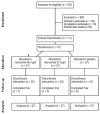A placebo controlled trial of memantine as an adjunct to oral naltrexone for opioid dependence
- PMID: 21715107
- PMCID: PMC3199033
- DOI: 10.1016/j.drugalcdep.2011.05.019
A placebo controlled trial of memantine as an adjunct to oral naltrexone for opioid dependence
Abstract
Background: Preclinical findings suggest that the inhibition of NMDA glutamatergic neurotransmission may have beneficial effects in the treatment of opioid dependence.
Aims: We hypothesized that memantine, a low-potency, uncompetitive NMDA receptor antagonist, would be safe and effective when used as an adjunct to oral naltrexone in the treatment of opioid dependence, particularly in preventing relapse to opiate use in detoxified individuals.
Methods: Opioid-dependent participants (N=112) were enrolled. Following detoxification all participants were inducted onto oral naltrexone and were randomized to receive memantine 15 mg bid (N=27), memantine 30 mg bid (N=27) or placebo (N=27) for 12-weeks in combination with naltrexone 50mg/day and individual relapse-prevention therapy. The primary outcome was the retention in treatment since treatment dropout is most commonly associated with relapse to opiate use.
Results: Twenty-six percent of participants withdrew from treatment prior to starting naltrexone. Of those that were randomized 35% completed 4 weeks only, and 24% completed all 12 weeks of treatment. There was no significant difference in treatment retention or heroin use, opiate withdrawal symptoms and craving between the groups treated with memantine vs. placebo.
Conclusion: Thus, the efficacy of memantine 30 or 60 mg/day as an adjunct to oral naltrexone for the treatment of opiate dependence was not supported.
Copyright © 2011 Elsevier Ireland Ltd. All rights reserved.
Conflict of interest statement
In the past Dr. Bisaga received an educational grant supporting his preclinical work from Merz Pharmaceuticals, an originator of memantine and its distributor in some countries. Drs. Bisaga and Nunes currently receive medication from Alkermes for an ongoing study that is sponsored by the National Institute on Drug Abuse. All other authors declare that they have no conflicts of interest to report.
Figures
References
-
- Aguilar MA, Manzanedo C, Do Couto BR, Rodriguez-Arias M, Minarro J. Memantine blocks sensitization to the rewarding effects of morphine. Brain Res. 2009;1288:95–104. - PubMed
-
- Bisaga A, Comer SD, Ward AS, Popik P, Kleber HD, Fischman MW. The NMDA antagonist memantine attenuates the expression of opioid physical dependence in humans. Psychopharmacology (Berl) 2001;157:1–10. - PubMed
-
- Bisaga A, Popik P. In search of a new pharmacological treatment for drug and alcohol addiction: N-methyl-D-aspartate (NMDA) antagonists. Drug Alcohol Depend. 2000;59:1–15. - PubMed
-
- Carroll KM, Ball SA, Nich C, O’Connor PG, Eagan DA, Frankforter TL, Triffleman EG, Shi J, Rounsaville BJ. Targeting behavioral therapies to enhance naltrexone treatment of opioid dependence: efficacy of contingency management and significant other involvement. Arch Gen Psychiatry. 2001;58:755–761. - PMC - PubMed
Publication types
MeSH terms
Substances
Grants and funding
LinkOut - more resources
Full Text Sources
Medical



